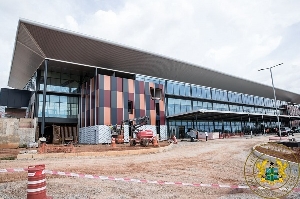- Home - News
- TWI News | TV
- Polls
- Year In Review
- News Archive
- Crime & Punishment
- Politics
- Regional
- Editorial
- Health
- Ghanaians Abroad
- Tabloid
- Africa
- Religion
- Election 2020
- Coronavirus
- News Videos | TV
- Photo Archives
- News Headlines
- Press Release
General News of Wednesday, 11 April 2001
Source: The Independent
GIJ Goes Degree in September
The degree programme to be run by the Ghana Institute of Journalism (GIJ) will start this academic year with an initial intake of 40 students.
The batch, which would be made up of 20 senior secondary school leavers and 20 GCE Advanced Level certificate holders would start at levels 100 and 200 respectively. Mr. David Newton, Director of GIJ who announced this at the 40th graduation day of the Institute in Accra said a special programme is however being developed to enable GIJ diploma holders to start the degree programme at level 300 in 2002/2003 academic year.
"Beginning from this academic year, the Institute would offer a single diploma programme in communication studies, which would be a combination of both Journalism and |Public Relations. It means that students would only specialize at the degree level, he mentioned.
Mr. Newton disclosed that the status of the Institute has finally been confirmed by the National Accreditation Board as a tertiary Institution.
"In view of this we now propose a new legislative instrument for the Institute to give a legal backing to our tertiary status," he added.
The Director appealed to the Minister responsible for Media Relations to ensure that GIJ benefits from the National Education Fund to enable it finance its ongoing building project at its new site at Okpoglo. Mr. Kwabena Agyapong, Assistant to the Minister responsible for Media Relations, who represented the Minister as Guest of Honor, disclosed that government would soon enact a broadcast policy, which would guide the promotion of a truly informative and pluralistic media.
He said the policy would assist media personnel to use the medium of broadcasting to truly educate and inform the society and promote tolerance and divergent views. Mr. Agyapong expressed the NPP government's commitment to promote and enhance the highest journalistic standards in the country and said the government would therefore support journalism institutions like GIJ in order to enhance the development of quality journalism.
"To achieve this, our ministry would give priority attention to infrastructure development of GIJ, to attract the best available students and teaching staff", he added. He charged GIJ to review its curriculum to reflect the increasing importance of journalism.
"It is only by ensuring that the school's programme is able to train people to meet the challenges of the information technology age that the Institute can be regarded as a vital cog in the increasing shrinking world of globalization", he noted.
In a message, Mr. Nutifafa Kwenyehia, Chairman of the National Media Commission, told the graduands that the years of training is not an end but a beginning of a life long learning process.
"You should begin to learn from today, cultivate the virtues of honesty, truthfulness and eschew corruption if you want to be successful in your career", he added. He called on the graduands to be champions in promoting democracy, press freedom and the rule of law for the benefit of all.
Mr. Quranchie Adama-Tetteh, SRC President appealed to estate developers to consider building hostels for students at affordable prices to help reduce accommodation probleMs. In all 163 students, 82 from Journalism and 81 from Public Relations Advertising and Marketing, graduated, with 16 people failing. Awards were given to deserving students.
The overall best students in the Journalism and P.R. Classes went to Samuel Doe Ablordeppey and Kayeromi Gomez respectively.










